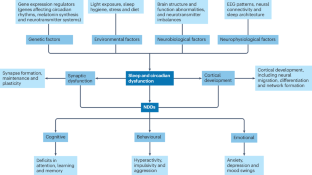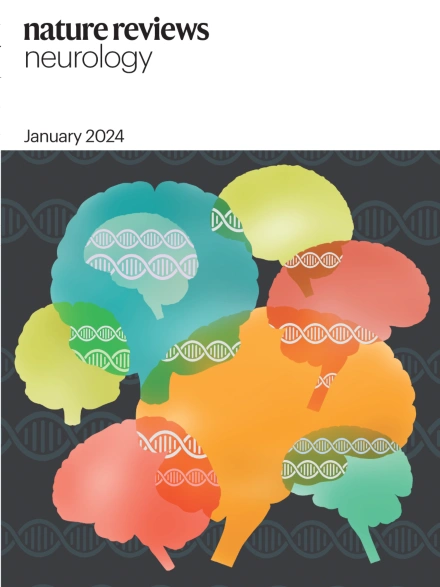Sleep and circadian disturbances in children with neurodevelopmental disorders
IF 28.2
1区 医学
Q1 CLINICAL NEUROLOGY
引用次数: 0
Abstract
Sleep is essential for brain development and overall health, particularly in children with neurodevelopmental disorders (NDDs). Sleep disruptions can considerably impact brain structure and function, leading to dysfunction of neurotransmitter systems, metabolism, hormonal balance and inflammatory processes, potentially contributing to the pathophysiology of NDDs. This Review examines the prevalence, types and mechanisms of sleep disturbances in children with NDDs, including autism spectrum disorder, attention-deficit hyperactivity disorder and various genetic syndromes. Common sleep disorders in these populations include insomnia, hypersomnia, circadian rhythm disorders, sleep-related breathing disorders and parasomnias, with underlying factors often involving genetic, neurobiological, environmental and neurophysiological influences. Sleep problems such as insomnia, night awakenings and sleep fragmentation are closely linked to both internalizing symptoms such as anxiety and depression, and externalizing behaviours such as hyperactivity and aggression. Assessment of sleep in children with NDDs presents unique challenges owing to communication difficulties, comorbid conditions and altered sensory processing. The Review underscores the importance of further research to unravel the complex interactions between sleep and neurodevelopment, advocating for longitudinal studies and the identification of predictive biomarkers. Understanding and addressing sleep disturbances in NDDs is crucial for improving developmental outcomes and the overall quality of life for affected individuals and their families. In this Review, the authors provide a comprehensive overview of the prevalence and impact of various sleep disturbances in children with neurodevelopmental disorders. The authors discuss potential underlying mechanisms of sleep disorders in this population, with clues from genetic disorders, and highlight the complex bidirectional relationship between sleep and neurodevelopment.


神经发育障碍儿童的睡眠和昼夜节律紊乱
睡眠对大脑发育和整体健康至关重要,特别是对于患有神经发育障碍(ndd)的儿童。睡眠中断会严重影响大脑结构和功能,导致神经递质系统、代谢、激素平衡和炎症过程的功能障碍,可能导致ndd的病理生理。本文综述了ndd儿童睡眠障碍的患病率、类型和机制,包括自闭症谱系障碍、注意缺陷多动障碍和各种遗传综合征。这些人群中常见的睡眠障碍包括失眠、嗜睡、昼夜节律障碍、睡眠相关呼吸障碍和睡眠异常,其潜在因素通常涉及遗传、神经生物学、环境和神经生理学影响。失眠、夜间觉醒和睡眠碎片等睡眠问题与焦虑和抑郁等内化症状以及多动和攻击性等外化行为密切相关。由于沟通困难、共病条件和感觉处理改变,对ndd儿童的睡眠评估提出了独特的挑战。该综述强调了进一步研究的重要性,以揭示睡眠和神经发育之间复杂的相互作用,提倡纵向研究和识别预测性生物标志物。了解和解决ndd患者的睡眠障碍对于改善发育结果和受影响个人及其家庭的整体生活质量至关重要。
本文章由计算机程序翻译,如有差异,请以英文原文为准。
求助全文
约1分钟内获得全文
求助全文
来源期刊

Nature Reviews Neurology
医学-临床神经学
CiteScore
29.90
自引率
0.80%
发文量
138
审稿时长
6-12 weeks
期刊介绍:
Nature Reviews Neurology aims to be the premier source of reviews and commentaries for the scientific and clinical communities we serve. We want to provide an unparalleled service to authors, referees, and readers, and we work hard to maximize the usefulness and impact of each article. The journal publishes Research Highlights, Comments, News & Views, Reviews, Consensus Statements, and Perspectives relevant to researchers and clinicians working in the field of neurology. Our broad scope ensures that the work we publish reaches the widest possible audience. Our articles are authoritative, accessible, and enhanced with clearly understandable figures, tables, and other display items. This page gives more detail about the aims and scope of the journal.
 求助内容:
求助内容: 应助结果提醒方式:
应助结果提醒方式:


